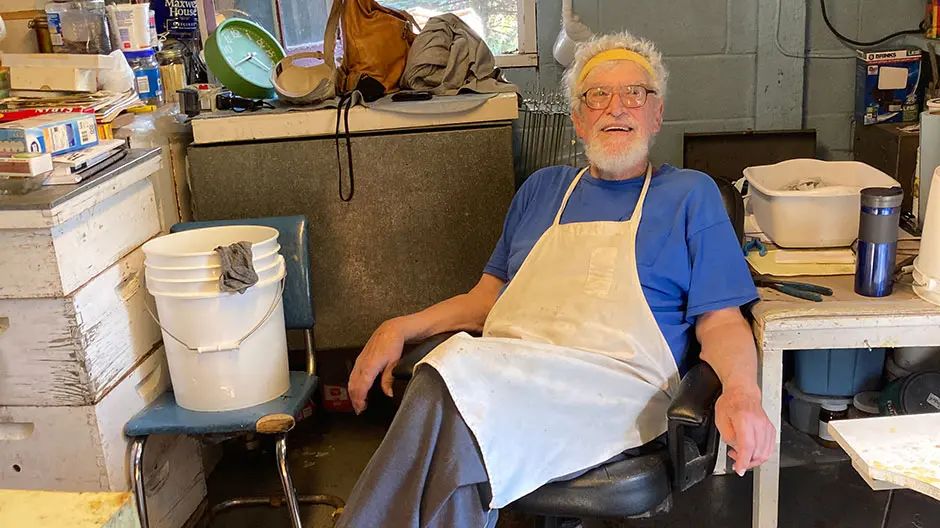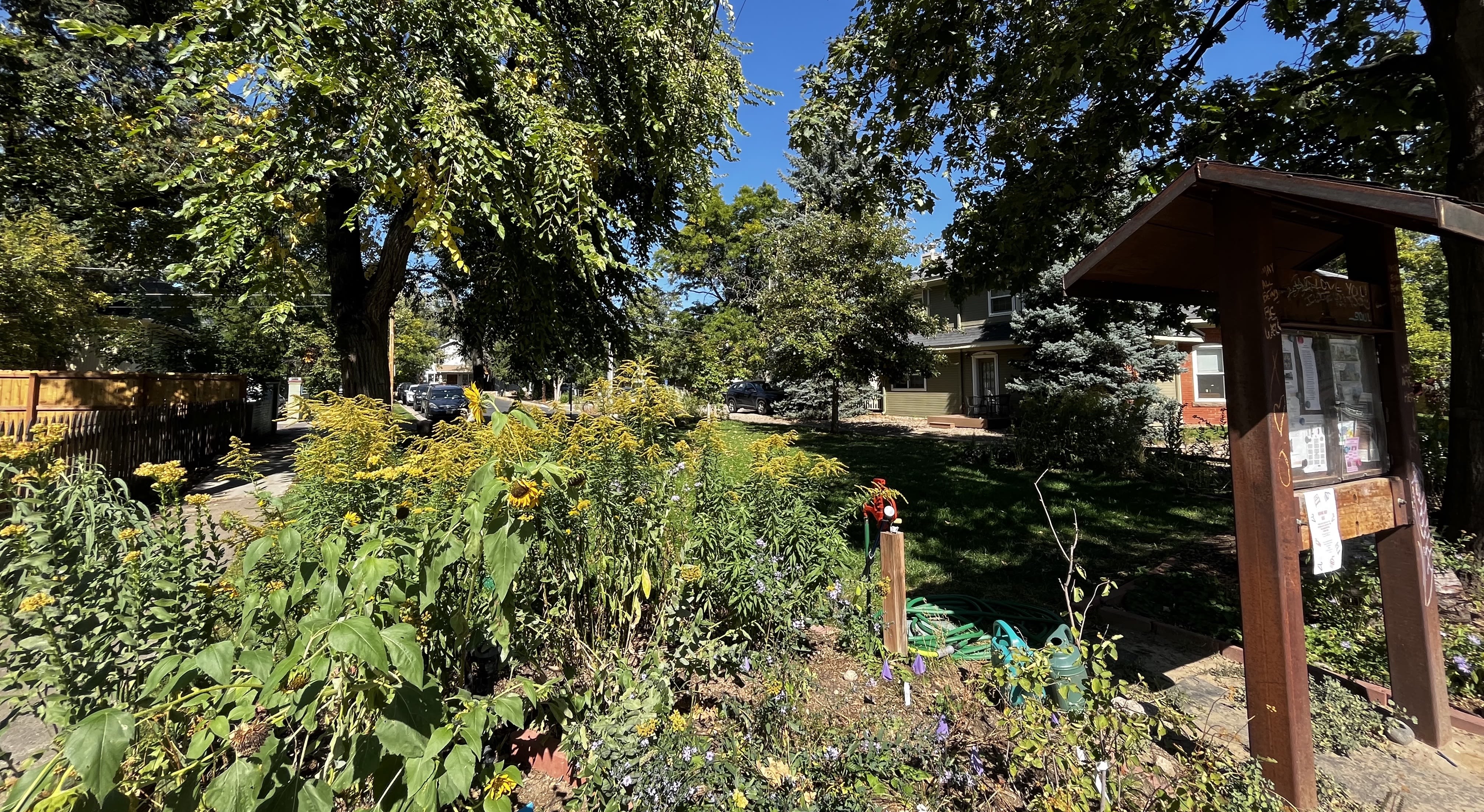Colorado beekeeper’s legacy lives on through pesticide ban
By Abby O'Brien

“Tom Theobald takes break from extracting honey.” From Notes from the Beeyard, Theobald’s beekeeping podcast.
“Tom Theobald takes break from extracting honey.” From Notes from the Beeyard, Theobald’s beekeeping podcast.
At the Boulder Pollinator Advocate graduation ceremony luncheon, Rella Abernathy speaks about Colorado's recently passed Senate Bill 23-266, which restricts the sale of neonicotinoid pesticides. Abernathy is Senior Ecologist for the Nature-Based Solutions Team in Boulder’s Climate Change Initiatives department.
It’s a sunny day at the Honeybee Harvest Festival in Niwot, Colorado. Live banjo music floats through the air as parents and children stroll down 2nd avenue wearing black and yellow bee antennae headbands. Dawn Server, antennae bobbling over her own head, is a beekeeper who co-organized the event to educate community members about the importance of pollinators. “We have adult education. We have a Tom Theobald speaker series,” says Server. “Tom Theobald worked to prevent the widespread use of neonicotinoids. So we have a speaker series in his honor.” Her face lights up with inspiration when she talks about the late Theobald.
Theobald was prominent in Colorado’s beekeeper and environmentalist circles. He was also known by beekeepers across the United States for being outspoken about the effects of neonicotinoid pesticides on bees. In the 1990s, Theobald began studying neonicotinoids’ effects on his own colonies and discussing his findings in blogs, columns, guest articles, and interviews with beekeeping publications. By the 2010s, his writing had sparked a national conversation about pesticide use and pollinator population decline.
Neonicotinoids are a highly effective class of insecticides derived from nicotine. They are some of the most widely used agricultural chemical compounds since their development in the 1980s. Farmers commonly use neonicotinoids as a seed treatment to make crops more pest-resistant. Until recently, the average Coloradan could purchase retail products containing neonicotinoids: home pest control solutions, landscaping treatments, veterinary products, and plants treated with neonicotinoids.
Earlier this year, Colorado, following states like New York and Massachusetts, passed a bill aimed at restricting the use of neonicotinoids. The new law bans retail stores from selling products containing neonicotinoids to consumers. Big box stores like Lowe’s and Home Depot had already pledged to phase out their use in products like live plants and outdoor pesticides, citing potential harm to pollinators. But Colorado’s law still permits registered pesticide dealers to sell neonicotinoids.
Bill Wirtz, senior policy analyst at the Consumer Choice Center, thinks there isn’t enough research to determine whether neonicotinoids harm pollinators. He worries that bans on the sale of neonicotinoids to consumers will lead to restrictions for farmers, which has happened in the European Union. “Neonicotinoids are important for farmers,” says Wirtz. “When you don't keep productivity level high, what you end up with is expensive food.”
Theobald was one of the first to sound the alarm about the potential harm of neonicotinoids to bees, when he noticed his own colonies weren’t reproducing after exposure to a neonicotinoid called imidacloprid. When the Environmental Protection Agency approved the use of another neonicotinoid, clothianidin, Theobald harshly criticized the study which was the policy’s basis. Environmental groups became particularly concerned about neonicotinoids’ effects on pollinators, which research has since shown includes toxicity to the central nervous system, lower fertility, and overall population decline.

A neonicotinoid-free pollinator garden planted by concerned citizens in Boulder’s Goss Grove neighborhood.
A neonicotinoid-free pollinator garden planted by concerned citizens in Boulder’s Goss Grove neighborhood.
It wasn’t until 2022 that the Environmental Protection Agency released biological evaluations of three common neonicotinoids, clothianidin, imidacloprid, and thiamethoxam, reporting adverse effects by the compounds on most species and critical habitats.
Boulder banned the use of neonicotinoids by city agencies in 2015, after a study turned up high levels of neonicotinoids in waterways. Rella Abernathy, Senior Ecologist in Boulder’s Climate Change Initiatives department, says repeat studies still show the presence of neonicotinoids. “So we know that that's coming from public use,” says Abernathy.
Wirtz feels the discrepancy proves his point about a lack of neonicotinoid research. “It confuses consumers,” says Wirtz. “Either the state determines through a regulatory agency that a certain chemical compound is toxic, or it's not, and then it should be allowed for any safe use.”
Both sides agree on one thing: neonicotinoid bans in the consumer sector, but not the agricultural sector, make no sense. Abernathy, like many Colorado environmentalists, is disappointed that the ban is only partial. “The only thing it can do is keep people from purchasing them at stores. They can still purchase them online. They can still hire a company to apply them to their property.” Still, she says, “anything that reduces use is good.”
Back in Theobald’s hometown of Niwot, beekeepers Alex Vargas and Miles McGaughey take the stage at the Honeybee Harvest Festival to give a presentation about a project of theirs, revitalizing habitat for native bees in areas burned by the Marshall Fires. Theobald was McGaughey’s mentor, and now McGaughey has taken Vargas, a younger beekeeper, under his own wing.
Theobald passed away in November 2021. He did not live to see Colorado become the tenth US state to pass anti-neonicotinoid legislation. But those who followed Theobald’s work are eager to continue in his footsteps with or without government help.
